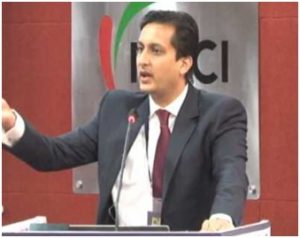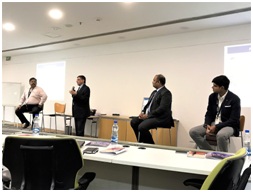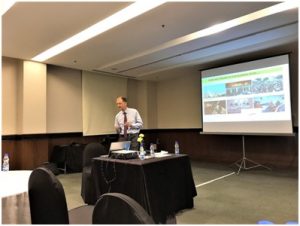FICCI to pursue GST Relief with the Finance Ministry
 In its recent meeting, FICCI’s Private Security Industry Committee has decided to aggressively pursue the matter of the unjust application of the Goods & Services Tax on the huge manned guarding sector. Speaking to SECURITY TODAY, Mr. Rituraj Sinha, the Committee Chair said, “the private security industry in India is still nascent and is likely to see exponential growth both in terms of manpower employed and market share due to rapid infrastructure and economic development, leading to an enhanced need for prevention, detection and protection of assets and citizens.”
In its recent meeting, FICCI’s Private Security Industry Committee has decided to aggressively pursue the matter of the unjust application of the Goods & Services Tax on the huge manned guarding sector. Speaking to SECURITY TODAY, Mr. Rituraj Sinha, the Committee Chair said, “the private security industry in India is still nascent and is likely to see exponential growth both in terms of manpower employed and market share due to rapid infrastructure and economic development, leading to an enhanced need for prevention, detection and protection of assets and citizens.”
The private security industry is one of the largest employers in India and is continuously growing. It employs over 5 million people as security guards (both male and female), who mainly belong to families which are below poverty level. Usually, they are the main source of income for their families, having migrated from backward areas/ villages to seek employment in cities.
 In July last year the government had levied 18% GST on the security services that over 10,000 Private Security Agencies (PSAs), who themselves are mainly small and medium enterprises (SMEs), render to their clients. The high GST rate of 18% on PSAs has created a cash flow problem for the agencies as normally the contracts under security services are being operated on 3 months’ credit period, which means additional funding will be required by these SMEs to deposit the higher tax. As a result, these security agencies who are already struggling with low margin and cash flow problems will be at risk to continue their business viably. This in turn will raise environmental security concerns for the society, job uncertainty for the large work force, and the risk to their clients’ assets.
In July last year the government had levied 18% GST on the security services that over 10,000 Private Security Agencies (PSAs), who themselves are mainly small and medium enterprises (SMEs), render to their clients. The high GST rate of 18% on PSAs has created a cash flow problem for the agencies as normally the contracts under security services are being operated on 3 months’ credit period, which means additional funding will be required by these SMEs to deposit the higher tax. As a result, these security agencies who are already struggling with low margin and cash flow problems will be at risk to continue their business viably. This in turn will raise environmental security concerns for the society, job uncertainty for the large work force, and the risk to their clients’ assets.
“We are pushing for a reduction of GST levied on Security Services from the current GST rate of 18% to 5% OR in case where the security services are provided by Private Security Agencies (PSAs), the obligation to discharge the GST should be shifted to the recipient of service OR imposition of GST only on the service charge component of the invoice or commission that the agencies charge rather than the full amount of the service invoice,“ disclosed Mr. Sinha
Currently, the nature of the security services business is such that employee wages and other statutory benefits and direct costs account for 85 to 90% of the invoices raised by the security agency on their clients. The revenues which they receive, are wages which are paid by the customer and are a direct pass through to the security workforce. Unlike the manufacturing or construction industry, where companies get tax breaks on depreciation, there is negligible capital expenditure in the manned guarding business and the employees are the main costs, so no such benefits can be availed by the agencies.
A relief from the GST Council will go a long way to shore up this important sector, that contributes immensely to the national economy as well as to national security.
ASIS New Delhi Chapter #207 holds its 1st meeting for 2018
 The ASIS New Delhi India Chapter held its first meeting this year in Gurgaon under the Chairmanship of Mr. Manish Datta, Cluster Security Director, South East Asia of Teva API India recently. It attracted over 70 delegates from the ASIS and OSAC communities of the region. The Keynote Address was delivered by Mr. Babu Thiagarajan, Country General Manager of Fidelity International (also the host). A very enlightening talk by Prof (Dr) Triveni Singh, Additional SP Special Task Force, UP Police, on Facts and Myths of Cyber Crime Investigations followed. Third session was on Best Practices on Travel Risk Management by Ms. Geetika Mala the Global Travel Security Manager at Cognizant Technology Solutions. After this an interesting panel discussion on the topic – Dealing with Crisis which has State/Multi-State Business Ramifications and Sharing of Business Strategy and Taking the Right Decisions followed. The panelists included Col Sameer Anukul, Regional Security Manager, South Asia- EI DuPont India, Mr. Mark Lushington, CEO South, NISA Global, Mr. Man Singh Yadav, Vice President, Global Enterprise Resilience & Security, Blackrock, and Mr. Ajeet Kumar Rai, Manager Corporate Security, Cognizant Technology Solutions.
The ASIS New Delhi India Chapter held its first meeting this year in Gurgaon under the Chairmanship of Mr. Manish Datta, Cluster Security Director, South East Asia of Teva API India recently. It attracted over 70 delegates from the ASIS and OSAC communities of the region. The Keynote Address was delivered by Mr. Babu Thiagarajan, Country General Manager of Fidelity International (also the host). A very enlightening talk by Prof (Dr) Triveni Singh, Additional SP Special Task Force, UP Police, on Facts and Myths of Cyber Crime Investigations followed. Third session was on Best Practices on Travel Risk Management by Ms. Geetika Mala the Global Travel Security Manager at Cognizant Technology Solutions. After this an interesting panel discussion on the topic – Dealing with Crisis which has State/Multi-State Business Ramifications and Sharing of Business Strategy and Taking the Right Decisions followed. The panelists included Col Sameer Anukul, Regional Security Manager, South Asia- EI DuPont India, Mr. Mark Lushington, CEO South, NISA Global, Mr. Man Singh Yadav, Vice President, Global Enterprise Resilience & Security, Blackrock, and Mr. Ajeet Kumar Rai, Manager Corporate Security, Cognizant Technology Solutions.
All in all, it was an interesting educational and networking event. The hospitality was extended by FIL India Business and Research Services Private Limited.
OSAC invites its members to an event organised by Shell India
 Shell Corporate Security, India recently organised organised a Leadership Interactive Session under the OSAC ‘Leader Speak Series’ and had their VIce President of Global Corporate Security Mr. James Hall address and interact with security professionals and industry peers. It was an informative session where the experienced speaker made the audience aware of the risks to their assets, people and information that large oil and gas companies face while operating in often hostile and remote environments across many continents. The gathering comprising senior security professionals from some very large organisations enjoyed listening to the speaker.
Shell Corporate Security, India recently organised organised a Leadership Interactive Session under the OSAC ‘Leader Speak Series’ and had their VIce President of Global Corporate Security Mr. James Hall address and interact with security professionals and industry peers. It was an informative session where the experienced speaker made the audience aware of the risks to their assets, people and information that large oil and gas companies face while operating in often hostile and remote environments across many continents. The gathering comprising senior security professionals from some very large organisations enjoyed listening to the speaker.


